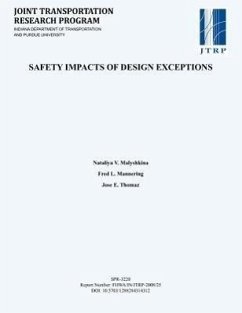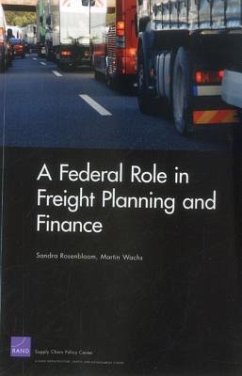
Development of a Framework for Ex Post Facto Evaluation of Highway Project Costs in Indiana
Versandkostenfrei!
Versandfertig in über 4 Wochen
28,99 €
inkl. MwSt.

PAYBACK Punkte
14 °P sammeln!
Researchers and engineers continue to ponder the reliability of construction cost forecasts made at the early stages of project development. After a project has been incorporated in the statewide transportation improvement program, increasingly detailed estimates of its cost are prepared at the remaining stages of project development, namely, design estimate, engineer's estimate, and bid estimate. This study presents a methodology for identifying contracts that are likely to experience cost overrun at different stages of the project development process. Also, the study analyzes escalation patt...
Researchers and engineers continue to ponder the reliability of construction cost forecasts made at the early stages of project development. After a project has been incorporated in the statewide transportation improvement program, increasingly detailed estimates of its cost are prepared at the remaining stages of project development, namely, design estimate, engineer's estimate, and bid estimate. This study presents a methodology for identifying contracts that are likely to experience cost overrun at different stages of the project development process. Also, the study analyzes escalation patterns of cost estimates across the stages of project development. The application of the methodology is demonstrated using data from Indiana. For the case study, the results showed that for expansion (capacity addition) and bridge contracts, the probability of cost overrun increased with increase in contract size. For pavement projects, large contracts (exceeding $5 million) were found to be more likely to experience a cost underrun than small contracts. Pavement contracts in urban areas were found to be more likely to experience cost overrun than their rural counterparts. For expansion and bridge contract cost overrun, no significant difference in cost overrun likelihood was found between urban and rural areas. Expansion and pavement contracts on Non-NHS highways were found to be more likely to experience cost overrun than such contracts on NHS highways. Bridge contracts on Interstates were more likely to experience cost overrun than Non-Interstates. Furthermore, it was found that as the time duration between project proposal and design completion increased, the tendency of a contract to experience cost overrun increased. Longer time spans between project proposal and letting were also found to increase the probability of cost overrun. In addition, the risk of occurrence of a particular escalation pattern was found to influence the probability of cost overruns.












